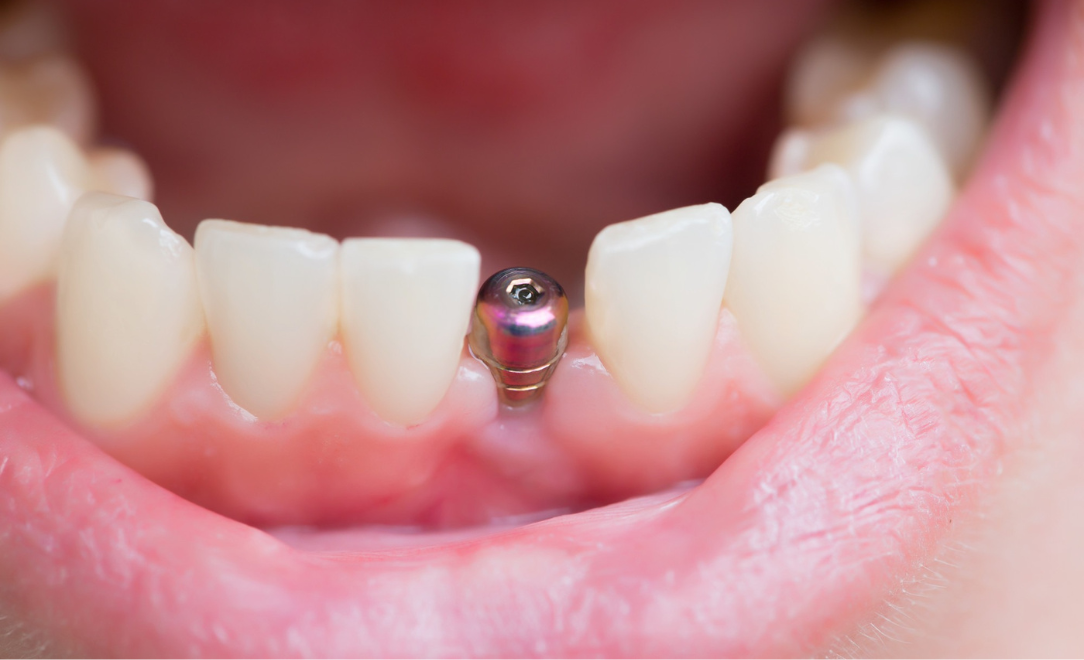If you are gearing up to get dental implants, you are not alone. Dentists place more than 3 million implants each year! Still, it is not uncommon to feel nervous about this procedure.
Before heading in for their appointment, most people want to know what the procedure will be like. They want to know if they will experience any side effects and the dental implant recovery timeline.
Today, we are bringing you this guide to dental implants and the dental implant recovery process. We want to help ease any concerns you may have about this procedure. That way, you will feel confident when you head in for your visit.
Are you ready to have all your dental implant questions answered? Then keep reading this guide for everything you need to know about getting dental implants.

The Dental Implant Procedure: Explained
People with missing or damaged teeth often get dental implants. Lower-cost alternatives to dental implants include crowns, bridges, and dentures. But implants are the only option that looks and functions like real teeth.
Getting dental implants does require surgery. The exact surgeries you will have to undergo will depend on your treatment plan, which, in turn, depends on factors like the number of implants you need and your oral health.
In general, though, most people can expect the following steps in the average dental implant procedure.
The Dental Exam
As with any dental treatment, your dentist will first want to take x-rays of your mouth. They may also want to take a plaster model of your teeth and/or jawbone.
Your dentist will also ask you about your medical history. Make sure to mention any medications you use or health conditions you have. Your medical history could impact your procedure.
For example, if you have health conditions that make you prone to infection, your dentist might administer an antibiotic before your procedure. That way, your risk of infection will decrease.
Anesthesia or Sedation
Your dentist will remove your tooth and drill holes in your jawbone to place the post. But you should not feel any pain during the procedure. Your dentist will give you local anesthesia or sedate you for the procedure.
Not sure which is best for you? Talk to your dentist, and the two of you can determine the best strategy for you.
Tooth Removal
To place an implant, your dentist must first remove the decayed one. You are in luck if the tooth is missing already because this part of your procedure is done.
Grafting (Optional)
You may or may not need bone grafting. People who do need bone grafts before an implant do not have enough healthy jawbone tissue to support the implant or have jawbone tissue that is extremely soft.
If you do need a bone graft, your dentist may harvest the tissue from your own bones or synthetic bone tissue. Either way, you will have to recover from the graft before your dentist can place the implant unless the grafting is minor.
Implant Placement
Now, it is finally time to place the implant. Here is how your dentist will do it.
First, your dentist will make a small incision on the place where he or she will place the implant. The cut will expose the underlying jawbone.
Next, your dentist will drill a hole in the jawbone. He or she will drill one hole for every dental implant you need.
Finally, your dentist will place a dental post in the hole. Most dental posts consist of titanium or titanium alloy, which has a lifetime of 25 or more years.
Recovery Period #1
Once your dentist places the post, you will have to go through a recovery period. Why? Because you have to wait for the jawbone to grow around the post, securing it firmly in place.
This step is important because the post will serve as the "root" of the dental implant. Your new tooth will only be as strong as the dental implant post.
Your dentist will provide you with tips and instructions to follow during your recovery period. Many of these tips will be the same as or at least similar to the recovery tips you will follow after the implant is placed.
Abutment Placement
A dental implant abutment is a metal piece that connects the post to the artificial tooth overlay. This is the second to last step in the dental implant procedure process.
Your dentist will anesthetize the area or sedate you to place the abutment. He or she will cut the gum again to expose the metal post in the jawbone. Then, your dentist will attach the abutment to the post.
Recovery Period #2
After your dentist places the abutment, you will have to spend more time recovering. Your gums have to heal from the cut the dentist made to place the abutment. This could take anywhere from three to six months.
Then, you can finally get your new tooth.
Artificial Tooth Placement
Finally, it is time to place the artificial tooth. Your dentist will screw the artificial tooth to the abutment. Some dentists may prefer to cement the artificial tooth to the abutment instead.
Once your dentist places the new tooth, you do not have to worry about taking it in or out, as with crowns and bridges. You can use and treat your implant like a normal tooth!
How Long Does Recovery After Dental Implants Take?
After you get your dental implant, you will be in recovery. The exact time it takes to recover depends on the person. But you can expect dental implant recovery times of two days or up to a few weeks.
The most important thing to do when you are recovering from dental implant placement is to rest. You may want to get time off from work, especially if you have a physically demanding job.
While you will probably feel back to normal after a week, your recovery is not over. You will need to adhere to your dentist's recommendations to ensure a full recovery.
Symptoms to Expect When Recovering from Dental Implant Surgery
The most common symptoms people experience after getting a dental implant are:
- Swollen gums and face
- Bruised gums and face
- Pain
- Minimal bleeding
Infections are also a possible side effect after dental implants. But as long as you follow your dentist's recovery guidelines, you should not have to worry about this symptom.
Dental Implant Recovery Tips
Full recovery from dental implants should take less than a month. However, if you fail to follow your dentist's recommendations, there could be consequences.
For example, failing to follow directions after your dentist places the post could result in the jawbone not healing properly. The dentist would then have to remove the post and try again in three or more months.
As mentioned, there is also the risk of infection. Dental implant placement is a type of surgery. Allowing your gums to heal properly is critical to preventing infection and further complications.
Get Plenty of Rest
Getting plenty of rest is the best thing you can do for your body when you are healing. Sleep and relaxation allow the body's immune system to work hard at healing the wounds in your mouth without any distractions.
Exercise and Eat Healthy
Exercising and eating healthy can also help speed up wound recovery. Here is how.
First of all, exercise helps with wound healing because it increases your blood flow. Blood is critical for helping wounds heal because it delivers oxygen to the injured site, and oxygen is a critical component of the healing process.
However, avoid strenuous exercise for the first few days after you get your implant. Focus on resting up. Then, you can progressively add exercise back into your routine.
Secondly, the macro- and micronutrients contained in healthy foods can also speed up healing. Our body uses carbohydrates from fruits and grains to power cells, including immune and healing cells.
Micronutrients like Vitamins A, B, C, and E are also critical for wound healing. Eating foods and taking supplements rich in these nutrients can help you recover from dental implant surgery faster.
Stop Smoking
Most dentists do not recommend implants for people who smoke. This is because smoking increases the risk of dental implant failure. It also increases the chances of getting an infection during recovery.
If you smoke and get a dental implant, it is critical that you stop smoking until you have recovered.
Stick With Soft Foods
You may experience pain and discomfort while you recover. We will talk about some ways to address that pain in a moment. But a super simple way to deal with discomfort is to avoid putting too much pressure on your new tooth.
Try to switch to a soft food diet for a few weeks after your surgery. But make sure you incorporate nutrient-rich foods like smoothies, mashed vegetables, and soft grains and proteins to ensure you are fueling your immune system.
Ice Your Face
Now, let's talk about some of the ways to deal with post-implant surgery pain. First of all, try icing your face around the area where you got your implant. Ice can be particularly helpful if you experience any bruising or swelling symptoms.
Use Over-the-Counter Painkillers
Dentists typically recommend using over-the-counter pain medications to deal with any post-operative pain. Try taking about 400–600 milligrams of an ibuprofen-containing painkiller every six to eight hours.
People who can not take ibuprofen should stick with Tylenol. Take one to two tablets every four hours.
In some cases, dentists will prescribe prescription pain medication. Make sure to follow the prescription directions accordingly.
Brush and Floss Regularly
You can resume your regular oral hygiene habits about 24 hours after you get your implant. Take special care of your teeth during recovery, making sure to brush and floss after meals.
Eliminating as much bacteria from your mouth as possible is important. This simple habit can decrease the chance of infection after implant surgery.
Attend All Follow-Ups
Your dentist may schedule one or more follow-ups after your surgery. He or she will check the implant to ensure the healing process proceeds as normal. Make sure to attend all these visits to prevent any complications.
Even after your follow-ups, make sure you attend your twice-yearly dental exams. This will prevent future bacteria buildup. If you get an implant due to tooth decay, this will prevent the need for another implant in the future.
Look Out for Signs of Infection
As if we have not harped on this enough already, we want to mention again how important it is to prevent infection after a dental implant procedure.
Studies show that up to 10% of dental implant recipients end up developing an infection. And over 65% of these people end up needing a second dental implant surgery.
You would then have to undergo this entire process again. What is more, you will have to pay for dental implants again.
That is a lot of wasted time and money! And you can prevent all that wasted time and money by following the tips we've outlined here.

Need Dental Implants in Montclair?
Dental implant surgery is no small thing. You will have to go under the knife to get the implant placed. Then, you will need to undergo dental implant recovery, which will take longer if you do not follow your dentist's recovery guidelines.
Are you looking for dental implant dentists in Montclair, New Jersey? At Montclair Dental Spa, we specialize in cosmetic and implant dentistry. Schedule a consultation today to set up your implant procedure!

